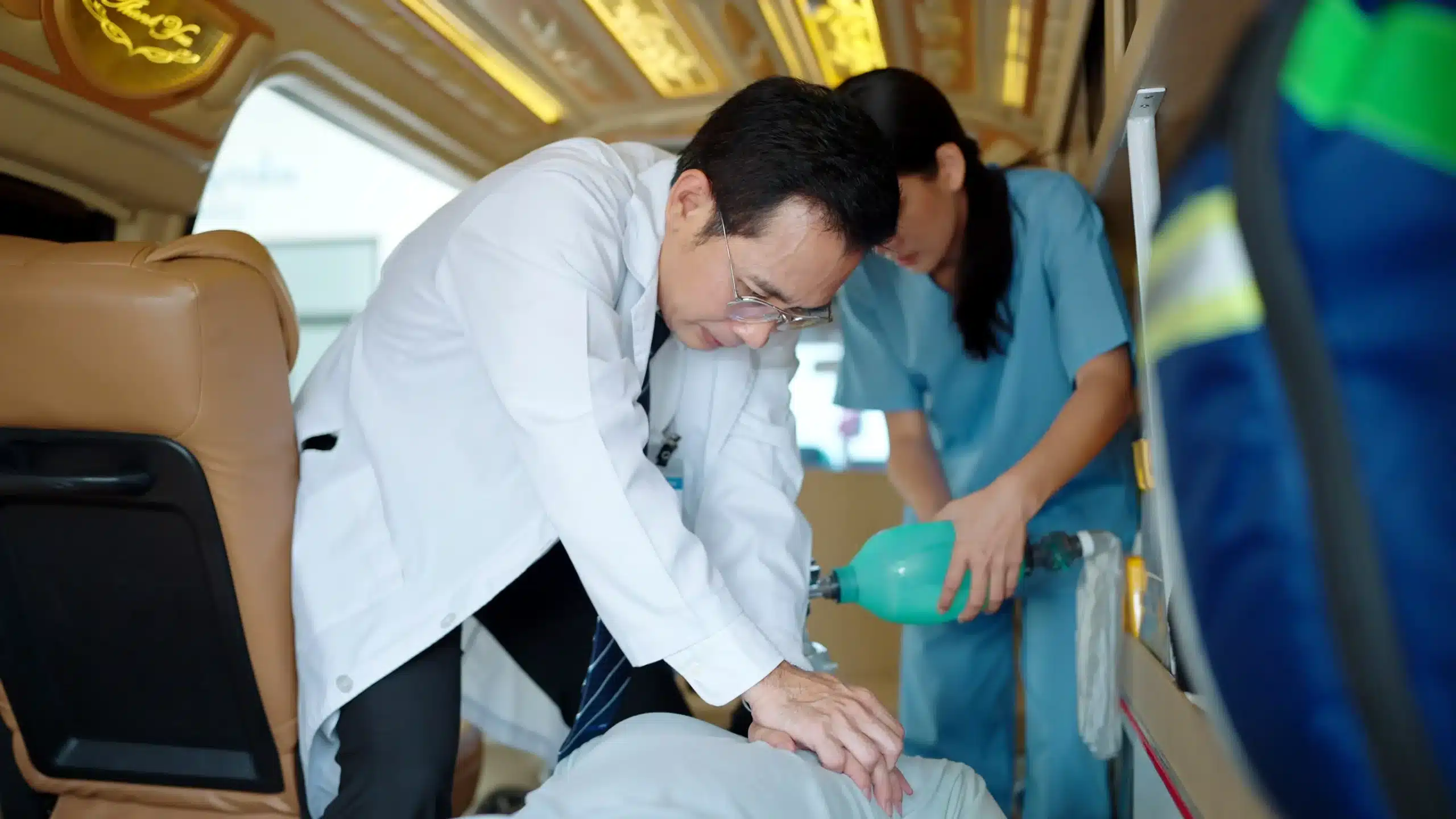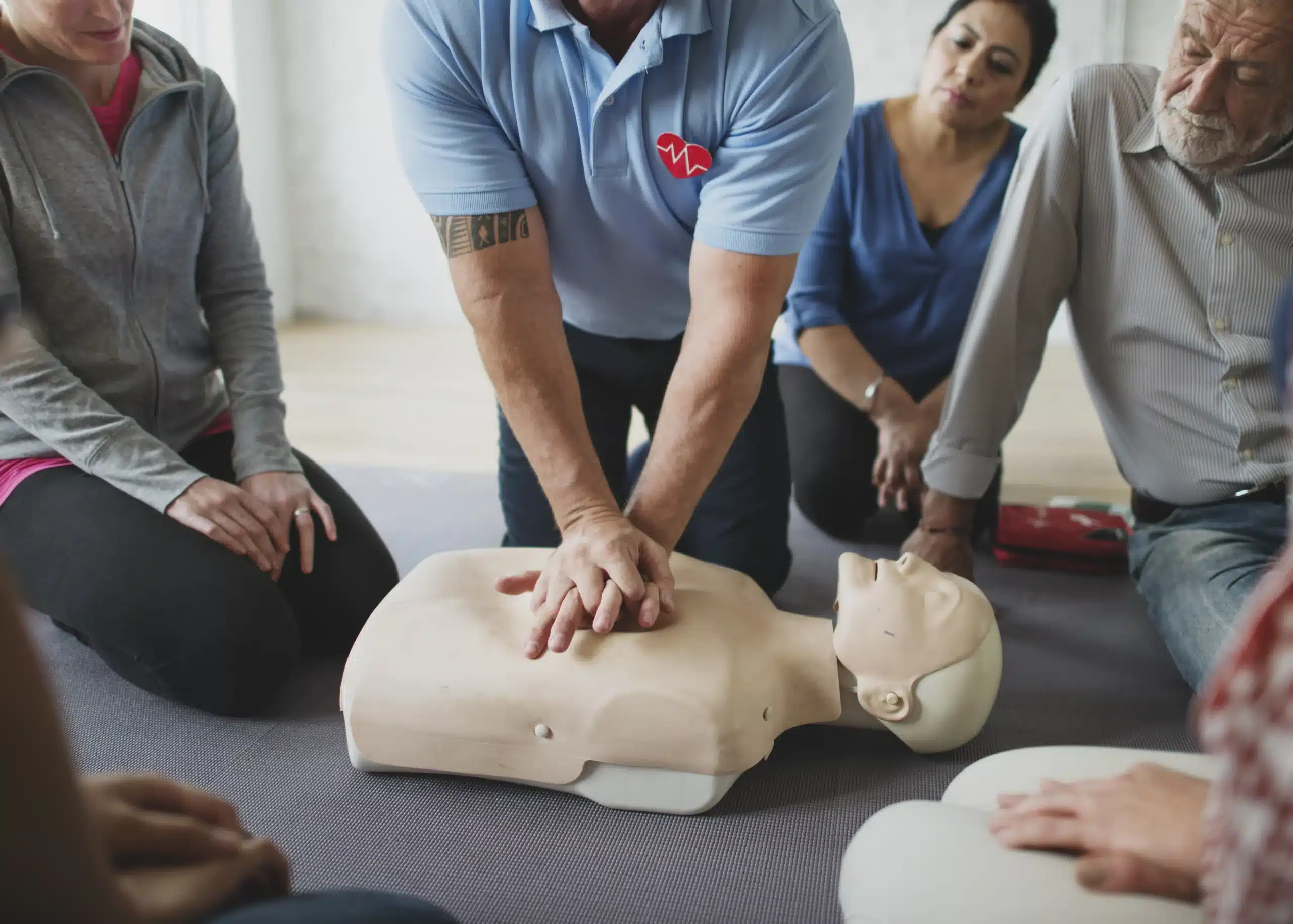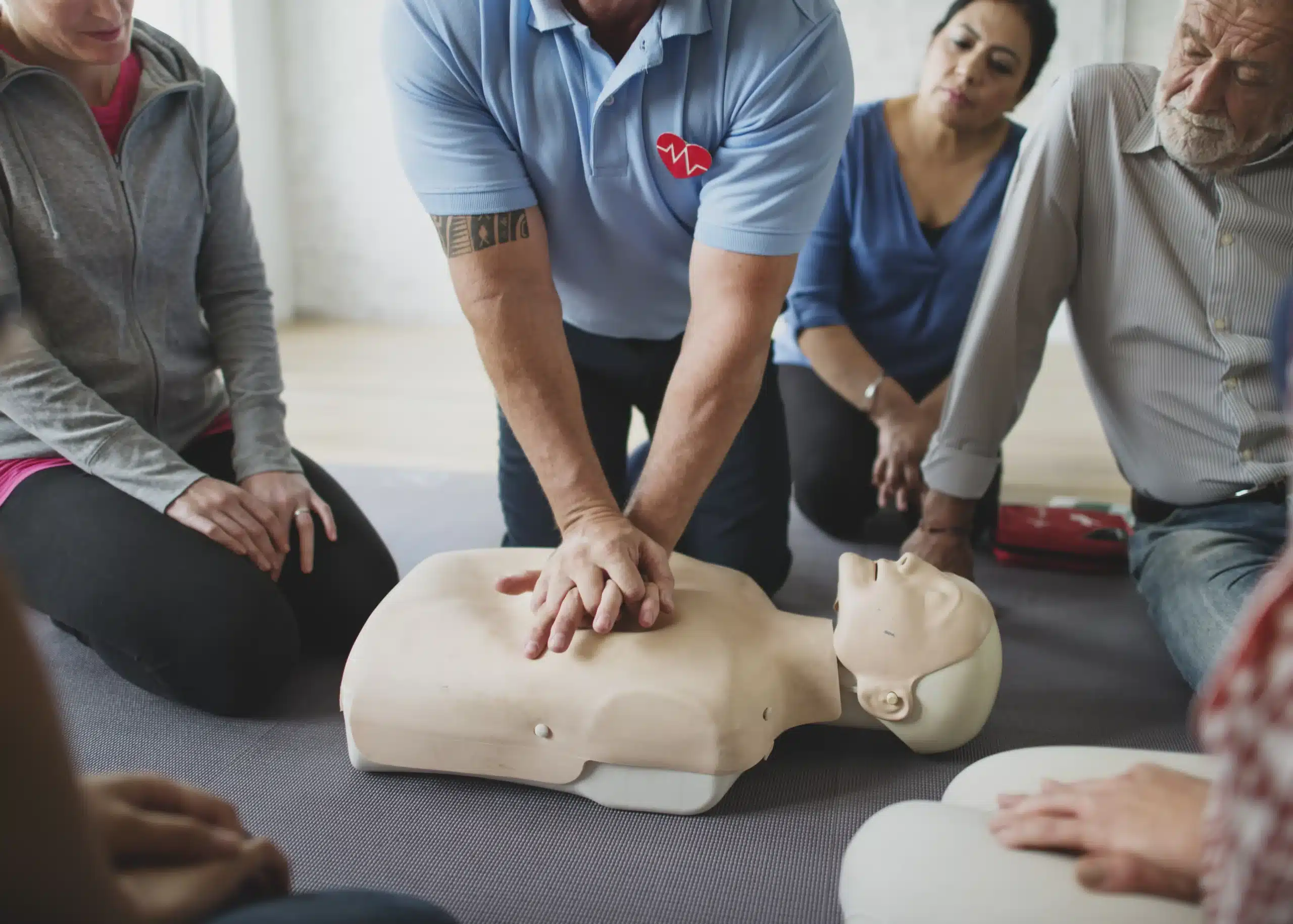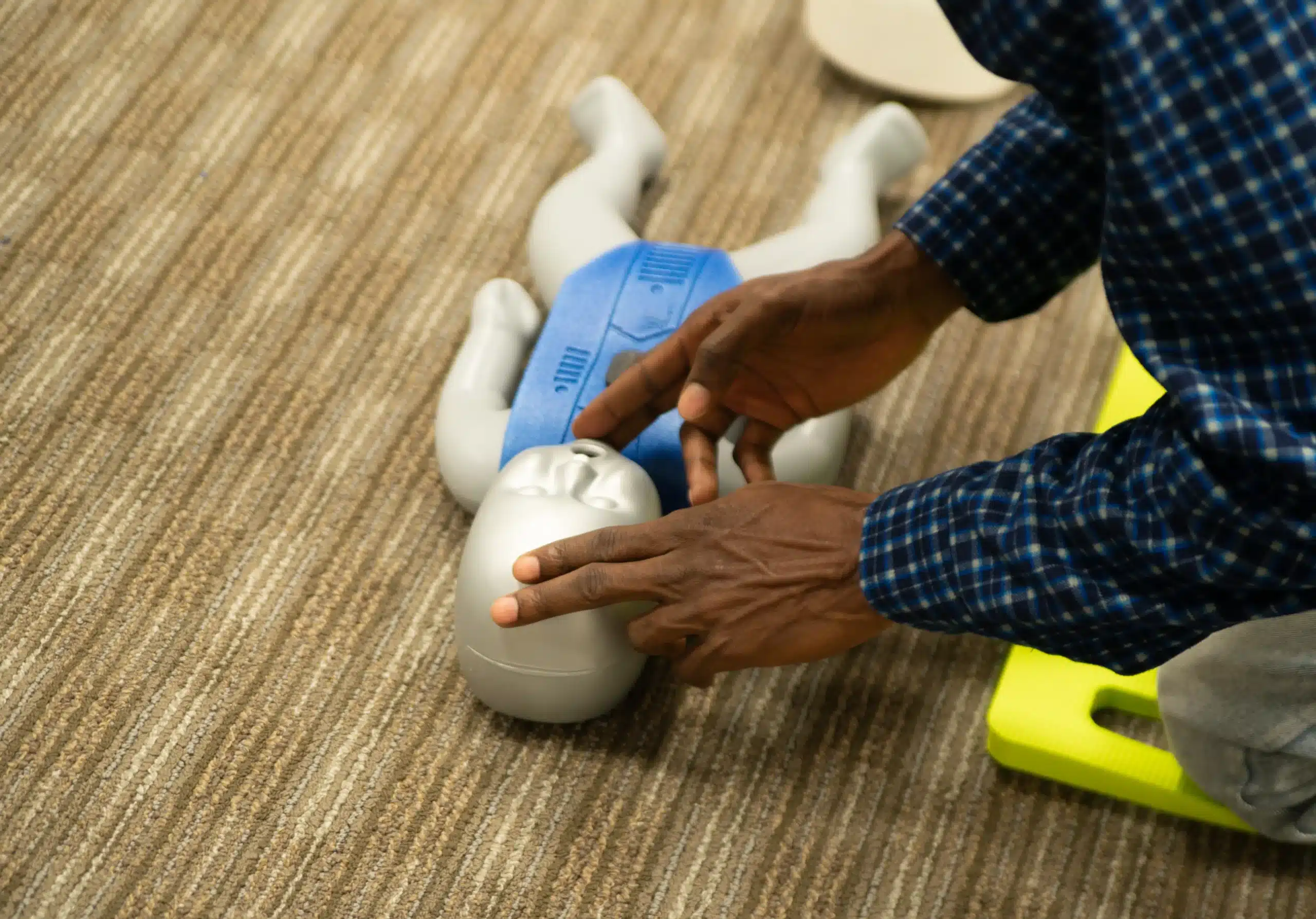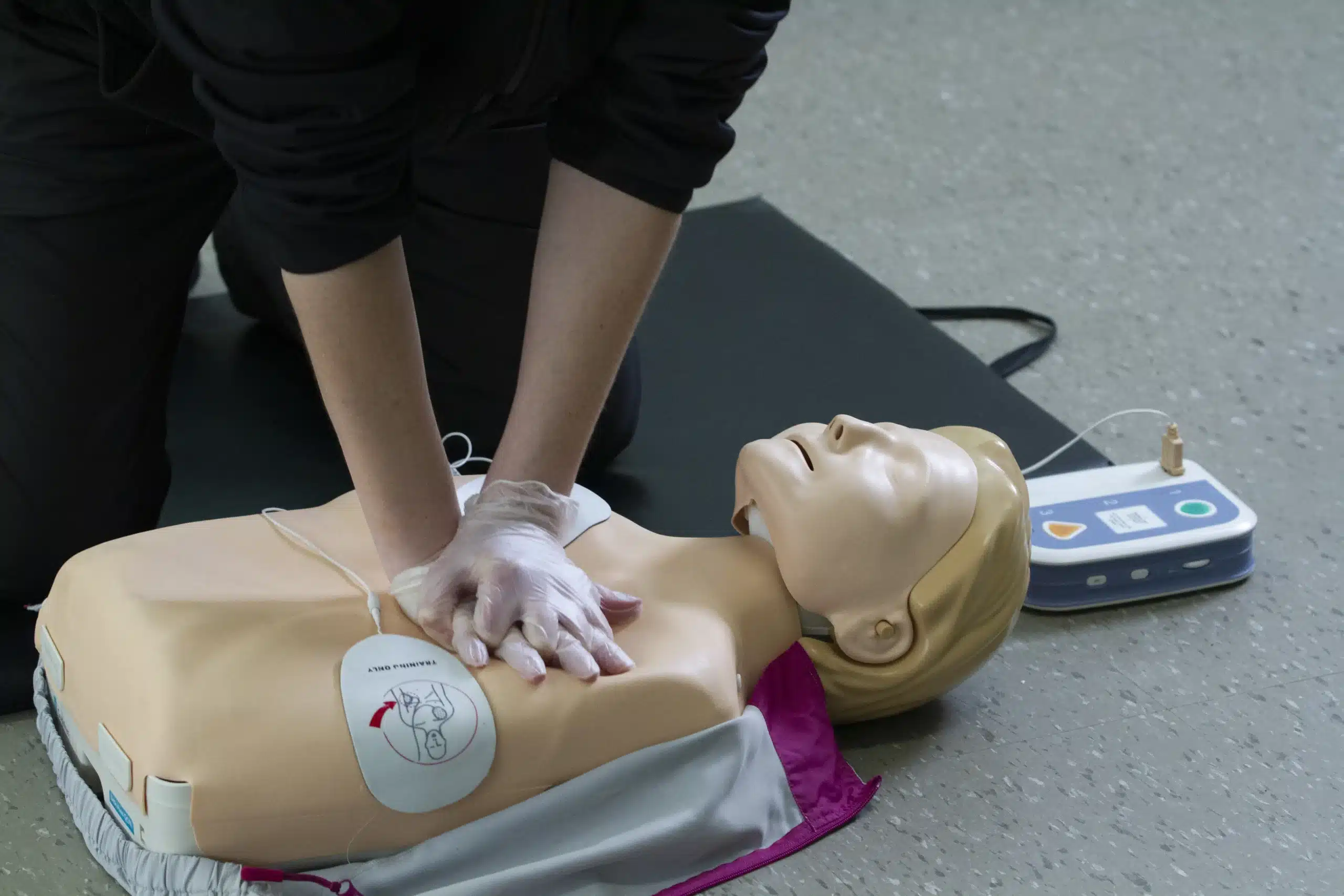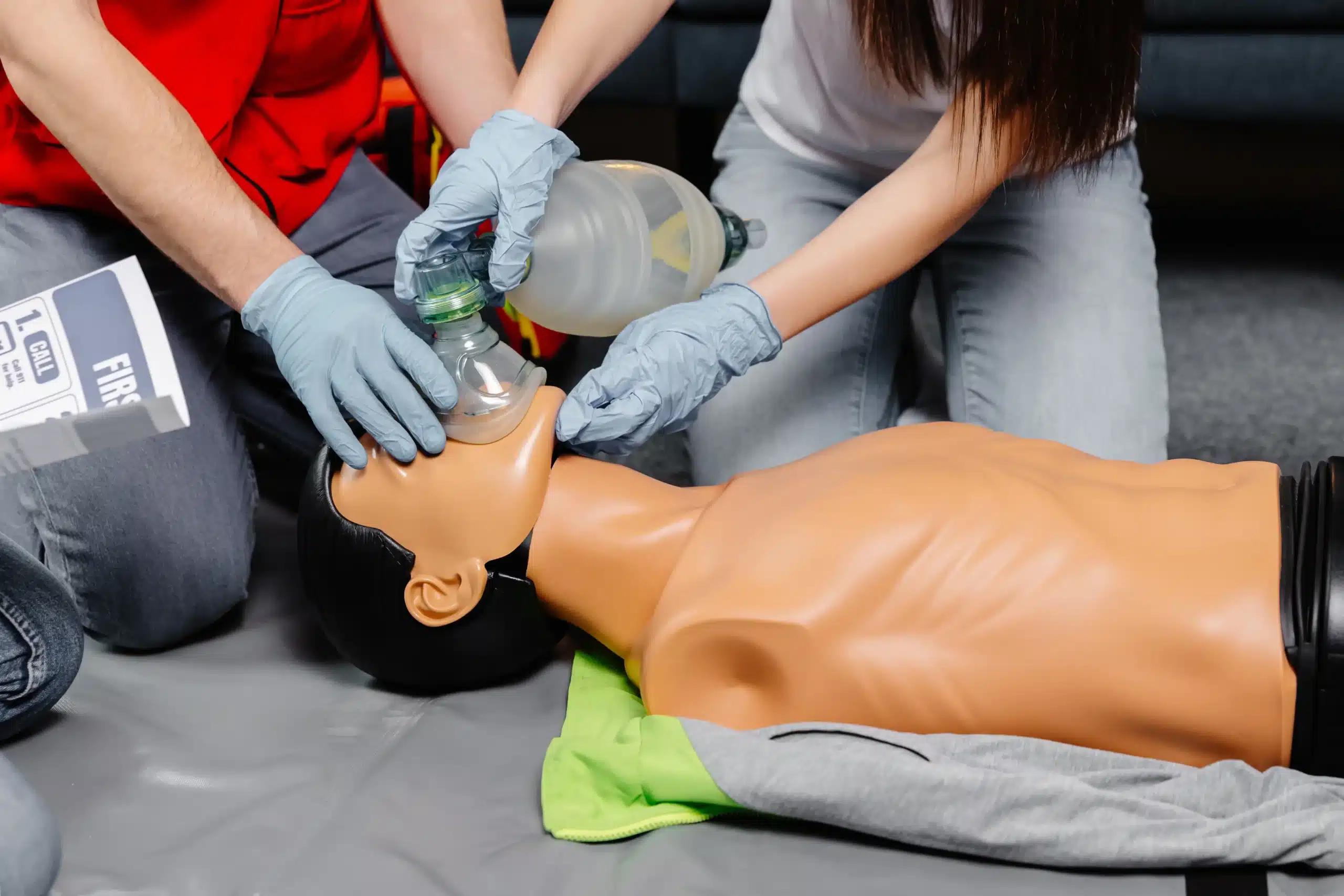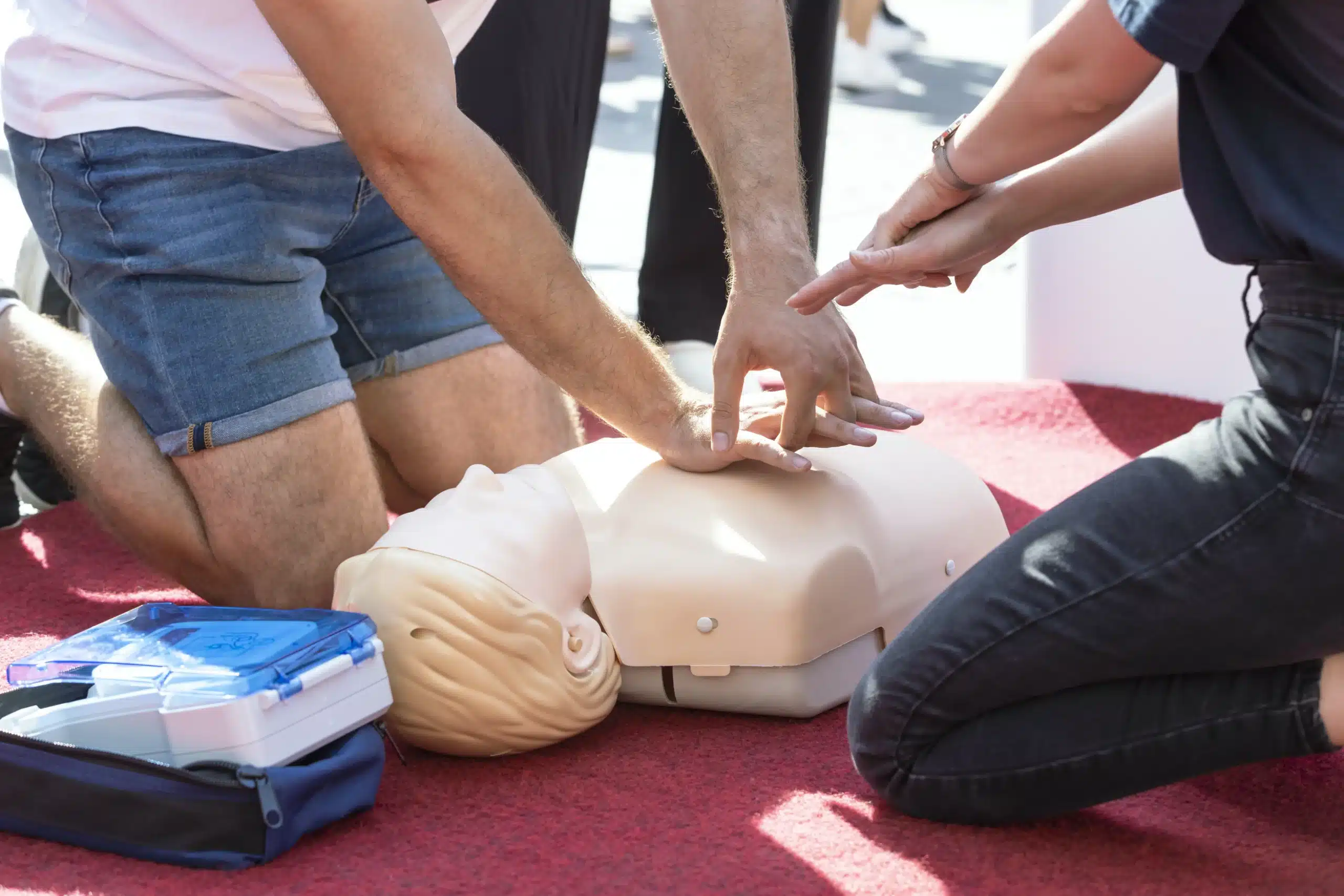Working in healthcare, you know that every second counts during a cardiac emergency. Having the right skills and knowledge can make all the difference. Advanced Cardiac Life Support (ACLS) training goes beyond basic CPR, equipping you with the advanced techniques needed to manage complex cardiovascular emergencies. If you’re a healthcare provider in San Jose, Campbell, or Cupertino, this guide will help you understand the importance of ACLS, find the right training program, and advance your career. We’ll cover everything from course content and certification requirements to the career benefits of ACLS and how it enhances patient care. Let’s explore how ACLS training can empower you to confidently handle critical situations and provide the best possible care in San Jose.
Key Takeaways
- ACLS is a vital skill for healthcare providers: It goes beyond basic CPR, giving you the expertise to manage complex cardiac emergencies and improve patient outcomes. If you’re a healthcare professional working in acute care, ACLS is a must-have.
- Finding the right ACLS course matters: Consider the training center’s reputation, AHA affiliation, course format (online, blended, in-person), and cost. Prioritize programs with hands-on practice and simulations for a well-rounded learning experience.
- ACLS certification boosts your career: It makes you a more competitive candidate, demonstrates your commitment to excellent patient care, and can open doors to advancement. Stay current with recertification and continuing education to maintain your skills and show your dedication to the field.
What is ACLS?
Advanced Cardiovascular Life Support (ACLS) is specialized training designed to equip healthcare professionals with the skills to manage cardiovascular emergencies. It goes beyond basic CPR, covering advanced techniques and interventions for life-threatening conditions like heart attacks, strokes, and respiratory emergencies. It’s the next level of preparedness for those on the front lines of healthcare.
Key ACLS Training Components
ACLS training isn’t limited to a single medical specialty. Doctors, nurses, paramedics, respiratory therapists, and other healthcare providers working in various settings—from emergency rooms to intensive care units—benefit from this training. The curriculum covers a wide range of topics, including airway management, rhythm recognition, and pharmacology for cardiac emergencies. ACLS certification emphasizes teamwork and effective communication during critical situations, ensuring coordinated patient care. It’s about creating a cohesive team response. At Campbell CPR Classes, we offer ACLS courses designed to meet the needs of healthcare professionals in San Jose, Campbell, and Cupertino.
Importance of ACLS in Healthcare
ACLS certification is crucial in healthcare. It empowers healthcare professionals to make quick, informed decisions during critical moments, potentially saving lives. Paramedics and EMTs use their ACLS training to begin treatment before a patient reaches the hospital, improving outcomes. ACLS is a cornerstone of high-quality emergency medical care, ensuring that healthcare teams are prepared for complex situations. It’s an investment in individual skills and the overall strength of our healthcare system. Our low price guarantee makes high-quality ACLS training accessible to everyone in Santa Clara County.
Top ACLS Certification Providers in San Jose
Finding the right provider for your Advanced Cardiovascular Life Support (ACLS) certification is crucial for your healthcare career. Here’s a look at some of the leading ACLS certification providers in San Jose:
Campbell CPR Classes
Campbell CPR Classes offers American Heart Association (AHA) ACLS certification right here in Campbell. They focus on providing high-quality training at competitive prices, making them a convenient and affordable option for those in the San Jose, Campbell, and Cupertino areas. As a woman-owned business, they are committed to excellent customer service and offer a low price guarantee. They also provide other essential certifications like BLS, PALS, and First Aid. If you’re looking for group discounts, they have options for that as well.
San Jose CPR Training Center
With two locations in San Jose—Willow Glen and Downtown—the San Jose CPR Training Center offers various AHA-certified courses, including ACLS. Their multiple locations offer convenient access for residents across the city. They also provide other certifications like BLS, PALS, and First Aid, making them a comprehensive resource for your certification needs.
CPR Training Center
The CPR Training Center in San Jose offers AHA ACLS certification with both classroom and blended learning options. This flexible approach allows you to choose the format that best suits your learning style and schedule. Their focus on managing complex cardiac emergencies ensures you receive comprehensive training to prepare you for real-world situations.
American Heart Association Training Centers
The American Heart Association itself doesn’t directly offer courses but accredits training centers across the country. You can find a list of AHA Training Centers on their website. These centers adhere to the AHA’s rigorous standards, ensuring you receive high-quality, up-to-date training. Recertification is crucial for healthcare providers to stay current with the latest advancements in ACLS care.
Local Hospitals Offering ACLS Courses
Many local hospitals in San Jose also offer ACLS courses. These courses are often geared towards their own staff but may also be open to the public. Check with hospitals in your area to see if they offer ACLS training. This option can be particularly beneficial for those already working in a hospital setting, providing convenient access to training and potential integration with existing hospital protocols. ACLS training is essential for various healthcare providers, including paramedics and EMTs, who often initiate interventions before reaching the hospital, highlighting the importance of ACLS in diverse healthcare settings.
ACLS Course Structure and Options
Choosing the right ACLS course format depends on your learning style, schedule, and preferences. Let’s explore the different structures and options available.
In-Person vs. Online Formats
ACLS courses are offered in various formats to meet diverse needs. Traditional in-person classes provide a structured environment with direct interaction with instructors and peers. This format allows for immediate feedback and hands-on practice. Blended learning options, like the ACLS HeartCode program, combine online learning with in-person skills sessions. This approach lets you study online at your own pace and then demonstrate your skills to an instructor. Fully online courses offer maximum flexibility for those with busy schedules. Providers like Star CPR offer various formats to suit different learning styles and schedules.
Course Duration and Content
ACLS courses cover a comprehensive curriculum to equip healthcare providers with the knowledge and skills to manage cardiac emergencies. Medtigo highlights how crucial ACLS training is for healthcare professionals who regularly face these situations. The course content typically includes airway management, rhythm recognition, and pharmacology. A standard ACLS renewal course, including online learning (3–4 hours) and a hands-on skills test (about 40 minutes), provides a refresher on these essential concepts. Our guide offers further details on renewal courses, including pricing.
Hands-on Skills Practice and Simulations
Practical application is critical to ACLS training. Master ACLS emphasizes the importance of hands-on skills practice to prepare healthcare professionals for real-world scenarios. ACLS courses incorporate simulations and scenarios to reinforce learning and build confidence. These often involve advanced medical equipment and realistic patient situations. As Bay Area CPR describes, the skills test may involve working independently with a voice-assisted manikin to demonstrate proficiency. This practical experience is invaluable for responding effectively in emergencies.
ACLS Certification Prerequisites and Requirements
Before you jump into an Advanced Cardiac Life Support (ACLS) course, it’s helpful to understand the prerequisites. Knowing what to expect upfront streamlines the process and lets you focus on mastering these lifesaving skills.
Required Certifications
Generally, there aren’t any required certifications to take an ACLS course. This means even if you’re new to healthcare, you can still enroll. However, a basic understanding of life support principles is beneficial. Many students find that taking a Basic Life Support (BLS certification course) beforehand provides a solid foundation for the more advanced concepts covered in ACLS. While not mandatory, it can significantly improve your learning experience.
Pre-Course Study Materials and Assessments
Most ACLS providers, including Campbell CPR Classes, require students to complete pre-course study materials and a self-assessment. These materials, often available online through the American Heart Association (AHA), cover essential concepts and procedures you’ll practice during the course. The self-assessment helps gauge your understanding of the material before the hands-on portion begins, allowing you to identify any areas where you might need extra focus. Completing these pre-course requirements ensures you’re well-prepared and ready to make the most of your ACLS training. It also reinforces that ACLS certification, while valuable throughout your career, involves ongoing learning and a commitment to staying updated with advancements in ACLS care. This ongoing education is crucial for providing the best possible patient care, especially since ACLS training applies to a wide range of healthcare providers who regularly encounter cardiac emergencies.
ACLS Certification Cost and Value in San Jose
Average Course Pricing
In San Jose, an Advanced Cardiac Life Support (ACLS) certification course typically costs around $290. This usually covers both the online portion, which takes roughly three to four hours, and the 40-minute, in-person skills test at a designated testing center. This investment is essential for healthcare professionals maintaining their certification and honing their emergency response skills. Campbell CPR Classes offers ACLS courses for those seeking a reliable option.
Available Discounts and Promotions
Looking to save on your ACLS certification? Keep an eye out for promotions! Many providers offer discounts, such as a recent flash sale that took $25 off all American Heart Association courses, including ACLS, CPR, BLS, and PALS. These deals can significantly lower the total certification cost. Check with your chosen provider, like Campbell CPR Classes, for current discounts. You can also visit their low price guarantee page for more information on how they strive to offer the best value.
Return on Investment for Healthcare Professionals
Earning your ACLS certification isn’t simply a requirement; it demonstrates a commitment to excellent patient care. It shows you’re ready to handle cardiac emergencies, leading to better patient outcomes and increased confidence in your skills. This dedication can also enhance your career prospects and professional reputation. Consider exploring the career benefits of ACLS certification to learn more about how it can impact your professional life.
What to Expect During an ACLS Course
Getting ready for an ACLS course? Here’s a glimpse of what you’ll learn, some common misconceptions, and why hands-on practice is so important.
Key Skills and Knowledge
An ACLS course equips healthcare professionals to manage cardiac emergencies. You’ll gain expertise in recognizing and treating life-threatening heart rhythms, providing advanced airway management, and understanding the pharmacology behind the medications used in these critical situations. The goal is to build your confidence in leading a team during a cardiac arrest or other serious cardiovascular event. Learn more about ACLS certification.
Common ACLS Training Misconceptions
One common misconception is that ACLS certification is a one-and-done deal. Like many certifications in the medical field, ACLS requires recertification to stay current with the latest guidelines and best practices. Another misconception is that ACLS is just advanced CPR. While CPR is a crucial element, ACLS training covers a much broader range of skills, including effective team dynamics and communication during emergencies. It’s a comprehensive approach to patient care during serious cardiovascular events. For more information on what ACLS entails, check out this helpful resource on common ACLS misconceptions.
Hands-on Practice and Simulations
ACLS courses aren’t just about lectures and textbooks. A significant portion of your training will involve hands-on practice and simulations. These simulations recreate real-life emergency scenarios, allowing you to apply your knowledge in a safe and controlled environment. Whether you’re a paramedic responding to a 911 call or a physician in a hospital setting, these simulations are invaluable for building the confidence and competence to handle diverse cardiac emergencies. You’ll learn how to work effectively as part of a team, make quick decisions under pressure, and ultimately provide the best possible care for your patients. Contact us to learn more about our hands-on training approach.
Maintaining Your ACLS Certification
Earning your ACLS certification is a significant achievement, but staying up-to-date with the latest advancements in cardiovascular care is equally important. This ensures you provide the best possible patient care and demonstrates your commitment to professional growth.
Renewal Requirements
ACLS certification is valid for two years. To maintain your credentials, complete a recertification course before your current certification expires. This refresher covers updates to ACLS guidelines and reinforces essential skills. While the core principles of ACLS remain consistent, medical knowledge and best practices are constantly evolving. Recertification ensures you’re equipped with the most current and effective techniques. CPR is fundamental to basic life support, but ACLS involves more advanced protocols and interventions that require regular review.
Continuing Education Opportunities
Beyond recertification, many options exist to expand your knowledge and skills in advanced cardiovascular care. Consider advanced workshops, relevant conferences, or further certifications like PALS (Pediatric Advanced Life Support) or RQI (Resuscitation Quality Improvement). These opportunities enhance your expertise and demonstrate your dedication to lifelong learning in the medical field. Any healthcare provider who might respond to a cardiac emergency benefits from ongoing ACLS education. It’s a valuable investment in your professional growth and ability to deliver exceptional patient care. Staying informed on the latest advancements in ACLS is key to being a well-rounded and effective healthcare professional.
Choosing the Right ACLS Provider in San Jose
Finding the right ACLS provider is crucial for a successful learning experience. With several options in San Jose, consider key factors before enrolling to ensure the training aligns with your professional goals and provides the skills you need to excel in emergencies.
Factors to Consider
ACLS training is essential for various healthcare providers who routinely manage cardiac emergencies. When selecting an ACLS provider in San Jose, think about your specific needs and the provider’s expertise. Look for a program like Campbell CPR Classes that caters to diverse medical professionals, from emergency room physicians and anesthesiologists to critical care nurses and paramedics. A provider with experience training these groups can enhance the quality of instruction you receive.
Consider the provider’s reputation and AHA affiliation. This ensures the curriculum adheres to the latest guidelines. Also, check if the provider offers continuing education to maintain your certification and stay up-to-date with advancements. A commitment to ongoing learning demonstrates a dedication to quality training.
Questions to Ask Before Enrolling
Before committing to an ACLS course, ask potential providers key questions. While CPR is a critical component of basic life support, ACLS training goes beyond CPR. Clarify whether the training covers advanced techniques like ECG interpretation, pharmacological interventions, and airway management. Ensure the course includes comprehensive protocols for managing various cardiac emergencies. A thorough program will equip you with advanced skills for complex situations.
Inquire about the course structure. Ask about the balance between classroom instruction, hands-on practice, and simulations. Adequate hands-on training is essential for developing the muscle memory and critical thinking skills to perform effectively under pressure. Ask about the class size. Smaller classes often allow for more personalized attention. Finally, ask about the provider’s Low Price Guarantee and any group discounts. Choosing the right ACLS provider is an investment, so make sure you get good value. If you’re looking for ACLS training in San Jose, contact us at Campbell CPR Classes.
Career Benefits of ACLS Certification
Holding an ACLS certification opens doors for healthcare professionals. It demonstrates a commitment to excellence in patient care and can significantly boost your career prospects. Let’s explore the advantages of becoming ACLS certified.
Enhanced Patient Care
ACLS certification equips healthcare providers with the advanced skills to manage cardiovascular emergencies. It goes beyond basic CPR (BLS Certification), providing a more comprehensive approach to resuscitation and stabilization. This specialized training empowers professionals to make quick, informed decisions, potentially saving lives. As noted by Medtigo, ACLS training is “crucial in emergency medical care,” applicable to a range of providers who encounter cardiac emergencies. This advanced knowledge translates to improved patient outcomes and a higher standard of care. Whether you’re a physician, nurse, or paramedic, ACLS gives you the tools to confidently handle critical situations.
Job Market Advantages and Career Advancement
In a competitive healthcare landscape, ACLS certification provides a distinct edge. Many employers prioritize candidates with this credential, recognizing its value in building a highly skilled workforce. Cascade Training points out that ACLS is “relevant to a wide range of medical professionals,” including emergency room physicians, anesthesiologists, critical care nurses, and paramedics. This makes it a valuable asset for anyone working in acute care settings. Beyond initial hiring, ACLS certification can also open doors to career advancement. It can create opportunities for specialized roles, leadership positions, and higher earning potential. Whether you’re just starting your career or looking to progress, ACLS certification can be a significant factor in your professional growth. Consider adding this valuable credential to your resume to stand out and pursue new opportunities. Contact us at Campbell CPR Classes to learn more about our ACLS certification courses.
ACLS vs. BLS: Key Differences
Understanding the difference between Advanced Cardiovascular Life Support (ACLS) and Basic Life Support (BLS) is crucial for anyone considering CPR certification. While both certifications equip you with life-saving skills, they address different needs and involve distinct levels of complexity. Let’s break down the key differences:
Skill Level and Complexity
ACLS certification covers advanced medical procedures and protocols, requiring a healthcare background and extensive training. It includes advanced airway management, medication administration, and ECG interpretation. Think of it as the next step for healthcare professionals who regularly manage complex cardiac emergencies. You’ll learn how to interpret ECGs and perform advanced interventions.
BLS focuses on fundamental life-saving techniques that anyone can learn. It primarily involves chest compressions and rescue breaths to maintain blood flow until professional help arrives. BLS certification is a great starting point for anyone interested in learning essential life-saving skills.
Target Audience for Each Certification
ACLS training is designed for healthcare providers, such as doctors, nurses, paramedics, and other emergency responders, who are likely to encounter cardiac emergencies in their work. It provides them with the advanced skills and knowledge necessary to manage complex cases and lead resuscitation teams. Contact us to learn more about ACLS training.
BLS certification is geared towards a broader audience, including non-healthcare professionals. This makes it accessible to anyone who wants to be prepared to respond to a cardiac emergency, from teachers and coaches to parents and caregivers. Campbell CPR Classes offers BLS training for individuals and discounted group classes for organizations. We also offer RQI classes. Check out our low price guarantee.
Related Articles
- ACLS Courses in Campbell: A Complete Guide
- ACLS HeartCode in Campbell: Flexible AHA Training – Campbell CPR Classes
- ACLS Courses in Cupertino: Your Complete Guide – Campbell CPR Classes
- ACLS Renewal Campbell: Your Complete Guide – Campbell CPR Classes
- CPR Certification in San Jose: A Complete Guide
Frequently Asked Questions
Do I need any prior medical certifications to take an ACLS course?
No, formal certifications aren’t required to enroll in an ACLS course. However, a basic understanding of life support principles is helpful. Many students find that completing a BLS certification course beforehand provides a solid foundation for the more advanced ACLS concepts.
How long is an ACLS certification valid, and how do I renew it?
ACLS certification is typically valid for two years. To renew, you must complete a recertification course before your current certification expires. This refresher course covers any updates to ACLS guidelines and reinforces essential skills.
What’s the difference between in-person and online/blended ACLS courses?
In-person ACLS courses offer a traditional classroom setting with direct interaction with instructors and peers, allowing for immediate feedback and hands-on practice. Online or blended learning options combine online coursework with in-person skills sessions, offering more flexibility for those with busy schedules. Both formats typically include a hands-on skills test.
What is the approximate cost of an ACLS certification course in San Jose?
ACLS courses in San Jose generally cost around $290. This usually includes both the online learning portion and the in-person skills testing session. Look for providers like Campbell CPR Classes that offer a low price guarantee and check for available discounts or promotions.
Beyond initial certification, how can I stay updated on the latest advancements in ACLS?
Continuing education is key to staying current in ACLS. Look for advanced workshops, conferences, and additional certifications like PALS or RQI. These opportunities enhance your expertise and demonstrate your commitment to providing the best possible patient care.


